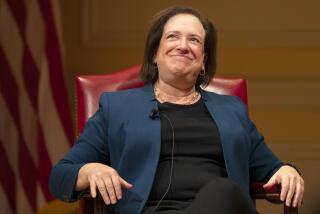Bird Court’s Death Penalty ‘Sympathy’ Ruling Voided
WASHINGTON — The U.S. Supreme Court, reversing a controversial opinion of the California Supreme Court, ruled Tuesday that a murderer’s rights were not violated when jurors were told not to be “swayed by mere sympathy.”
The case turned on a standard instruction given to juries weighing capital punishment. After hearing testimony, including that of 13 witnesses who told of the defendant’s difficult childhood and his “peaceful nature,” the judge told the jury that it “must not be swayed by mere sentiment, conjecture, sympathy, passion, prejudice, public opinion or public feeling.”
In 1985, California’s high court under Chief Justice Rose Elizabeth Bird said that this “anti-sympathy instruction” violated the U.S. Constitution because it would cause the jurors to ignore the testimony in the defendant’s favor. State Atty. Gen. John Van De Kamp appealed the decision, contending that the instruction simply tells jurors to put aside emotional reactions.
The U.S. Supreme Court, on a 5-4 vote, ruled that the state’s high court had no basis for rejecting the death penalty for Albert Greenwood Brown, convicted of the 1981 rape and murder of a 15-year-old Riverside girl. The ruling (California vs. Brown, 85-1563) could also clear away a major obstacle in nearly 100 other pending Death Row cases, in which similar instructions were given to jurors.
Chief Justice William H. Rehnquist, writing for the high court, said that a reasonable juror hearing such instructions from a judge “would likely interpret the phrase as an admonition to ignore emotional responses. An instruction prohibiting juries from basing their sentencing decisions on factors not presented at trial, and irrelevant to the issues at the trial, does not violate the U.S. Constitution.”
Rehnquist succeeded in holding together a conservative majority in two other rulings issued Tuesday.
The justices reinstated the conviction of a Colorado man who had told authorities when being questioned about firearms violations that he had “shot a guy once.” A Colorado appeals court had thrown out the man’s conviction on grounds that the confession was an outgrowth of unlawful questioning, because the man did not know that he was a suspect in the murder (Colorado vs. Spring, 85-1517).
And, they reinstated charges against a Connecticut man who had agreed to make an oral but not a written statement about his role in a sexual assault (Connecticut vs. Barrett, 85-899). In both cases, lower courts had said that the police procedures violated the Miranda rule, but the high court, on 7-2 votes, disagreed.
Official Lauds Rulings
Justice Department spokesman Terry Eastland applauded the two rulings limiting the Miranda decision, saying that they “move in the common-sense direction of voluntariness in the confession process rather than a formalistic reliance on Miranda.” A spokesman for the American Civil Liberties Union countered that the rulings “showed no intent to overturn Miranda.”
In his opinion in the California case, Rehnquist called the lower court ruling “strained” and said that it represented a “hypertechnical” reading of the instruction. It “ignores the crucial fact that the jury was instructed to avoid basing its decision on mere sympathy,” not to avoid sympathy altogether, he said.
In dissent, Justice William J. Brennan Jr. said that the instructions were confusing because they told jurors that “certain forms of emotions are permissible while others are not. While we generally assume that jurors are rational, they are not telepathic.” He was joined by Justices Thurgood Marshall and John Paul Stevens. Justice Harry A. Blackmun added a separate dissent, contending that mercy should play a part in the sentencing decision.
‘A Nice Victory’
California Deputy Atty. Gen. Jay Bloom said that the high court ruling was “a nice victory for us. It vindicates our position that the California Supreme Court has misread what the U.S. Supreme Court has said in the past about sentencing procedures.”
But Brown’s case now goes back to the state Supreme Court, and the case is “far from over,” Bloom added. The Bird court, in its ruling, which state attorneys will now seek to have reversed by the reconstituted state high court, had found other procedural flaws in Brown’s conviction and sentencing. The newly named California chief justice, Malcolm M. Lucas, had dissented in the case.
More to Read
Sign up for Essential California
The most important California stories and recommendations in your inbox every morning.
You may occasionally receive promotional content from the Los Angeles Times.











